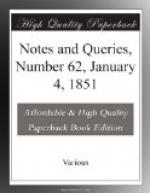“He likewise produced the mantle
of gold.
The king was amazed the sight to behold;
Though long time the shepherd had used
the same,
The king knew it marked with his own name.”
This discovery leads directly to the unwinding of the plot: the young prince makes himself known, and his father being sent for, the lovers are {3} “married in triumph” in Bohemia, and the old shepherd is made “a lord of the court.”
If any of your readers can inform me of another copy of the above ballad, especially unmodernised (the versification must have suffered in the frequent reprints) and in black-letter of an early date, they will do me a favour. At present I am unable to decide whether it was founded upon Greene’s novel, Shakspeare’s play, or upon some independent, possibly foreign, narrative. I am by no means satisfied that Greene’s novel was not a translation, and we know that he was skilful in Italian, Spanish, and French.
J. PAYNE COLLIER.
I cannot find the particular Number of NOTES AND QUERIES, but unless I am greatly mistaken, in one of them, a correspondent gave praise (I am the last to say it was not deserved) to DR. MAGINN for suggesting that miching mallecho, in Hamlet, Act III. Sc. 2., was from the Spanish mucho malhecho. I never heard of DR. MAGINN’s opinion until I saw it in your pages; but if you happen to be able to refer to the Shakspeare I superintended through the press in 1843, vol. vii. p 271., note 9., you will see that I propose the Spanish word malhecho as the origin of “mallecho.” I did not think this point worth notice at the time, and I doubt whether it is worth notice now. If you leave out this postscript, as you are at perfect liberty to do, I shall conclude that you are of my opinion.
J.P.C.
[The passage to which our valued correspondent refers is in our Second Volume, p. 358., where J.M.B. points out that the suggestion of a writer in the Quarterly Review for March 1850, that Shakspeare’s miching mallecho was a mere misprint of the Spanish words mucho malhecho, had been anticipated by DR. MAGINN. It now appears that he had also been anticipated by MR. COLLIER.]
* * * * *
CROSSING RIVERS ON SKINS.
The mode of crossing a river on skins, mentioned by Layard (Nineveh and its Remains, 5th edition, vol. i. p. 129., vol. ii. p. 381.) is also referred to in the works of the following ancient writers. I quote Facciolati Lexicon Totius Latinitatis, in vocibus Uter et Utricularius. [Edit. Furlanetto, 4to.]




